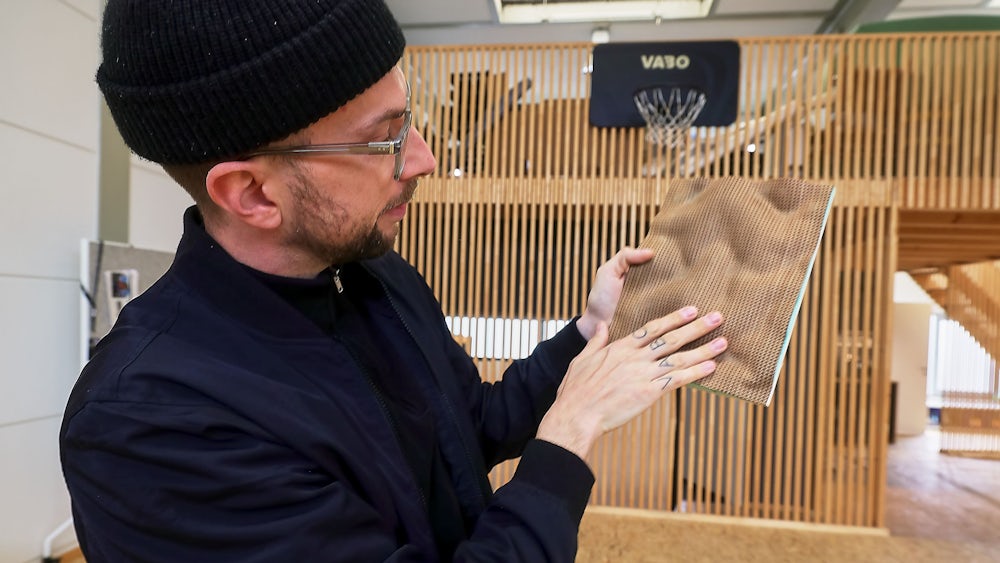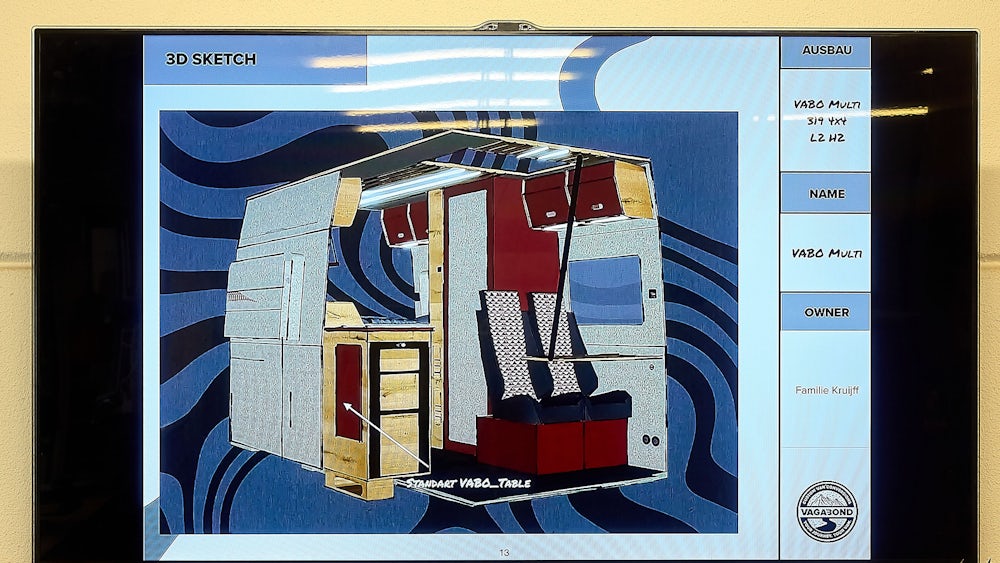In the Corona years, when the radius was limited and the longing for freedom was great, the camping and caravanning industry experienced a boom. However, the start-up company “Vagabond Vans”, which Andreas Stricker founded in 2021, did not benefit from this trend. “People wanted to get out quickly and bought up the entire used car market,” says the 34-year-old. The “Vabos”, which he and his team are building in a hall in the Farchet industrial park in Tölz, have waiting times of a year. Because the vans are not off the shelf, they are life’s dreams on four wheels. Made according to individual wishes, with modern technology and high-quality materials. And above all: beautiful design.
Only Mercedes Sprinters are converted; the young company has been cooperating with the car manufacturer for a year. The customers themselves or his company procure the empty vehicles, which are six meters long and 2.90 meters high. Not suitable for underground parking, but the vehicles are ready to travel and you don’t have to open the roof to create sleeping space, says Stricker.

The Vagabond vans are something like the Harley Davidsons of camper vans: furniture made of Austrian oak veneer, a scratch-resistant HPL coating in various colors from Italy. Loden wool from Austria is used for the side panels, which absorbs moisture. A smart home system ensures the right light. The floor is covered with recycled acrylic from Sweden. Because patchwork rugs on the bare van floor, “that doesn’t suit me at all,” says Stricker. He is proud of the multifunctional wet room with stainless steel drain, which is connected to the auxiliary heating and can be used as a “drying room.” This is interesting for surfers who want to hang up their wetsuits, or for families who can dry wet children’s clothes in bad weather.
“But what we can pay attention to is sustainability in the materials”
Sustainability is a big issue, says Stricker. The Sprinters are diesel vehicles. “But what we can pay attention to is sustainability in the materials.” Permanently installed chemical toilets are taboo. Instead, a dry toilet can be installed, the contents of which are compostable. And if someone wants a satellite dish for a television, “then we probably wouldn’t do that.” A Vagabond Van is probably not the right thing for camping fans on a tight budget. A converted Sprinter costs 180,000 euros and up. “That is definitely a luxury, and we are aware of that,” says Stricker.
The vans that he and his team convert are as individual as the customers. Adventurers who want to be on the road for months, families who need more sleeping space and a “bathroom”. People who value style even when camping. His customers are between 30 and 65 years old, including beginners – “50 percent have never been camping before,” says Stricker.

Every order starts with a blank sheet of paper. Stricker gives his customers homework: “Who are you, what do you want, where do you want to go.” This information forms the basis for the 3D visualization that the 34-year-old creates. He has also come across unusual requests: a niche for shirts, for example, or a built-in espresso machine. The expansion will be implemented in the two workshops in just over two months. “Then comes the emotional part,” says Stricker. The team is closely involved in every vehicle, and the handover to the customers, with whom they have been in contact for months, “is not without tears in nine out of ten cases.”
Stricker is a trained master saddler from Tyrol and an enthusiastic traveler himself. When his girlfriend, a native of Tölz, was pregnant with her first child, they wanted to travel in a camper van while on maternity leave. “But we had certain ideas that weren’t available on the market.” So Stricker converted a van himself. The young family spent three months traveling in Scandinavia – Denmark, Norway, Sweden – their dream destination to this day. “Scandinavians have a sense for good materials,” says Stricker. And for good design.
When Andreas Stricker needs inspiration, he goes to the Milan Furniture Fair
Because his passion has always been interior design, he gave up his job in Stuttgart and started his own business in Bad Tölz. When he needs inspiration, he goes to the Milan furniture fair rather than camping fairs. The “base” in the Tölzer Farchet doesn’t look like a commercial building either: an elegant, anthracite-colored staircase with spruce wood slats, a kitchenette with a clear design, a meeting corner with a mustard-yellow retro sofa. And a basketball hoop. Every morning, a few baskets are thrown there first and “played for breakfast,” says Stricker, laughing.

Five full-time employees, carpenters and body builders, work for the young company. There is also a mini-jobber, a part-time office worker and “Max, our Master of Finance”. Because creativity and numbers – “that doesn’t work for me,” says Stricker, who has the letters VABO tattooed on the fingers of his right hand. His start-up is doing well, and customers come from Germany, Austria and Switzerland. There is now a real “Vabo community” that meets once a year for an event. Last year, his company won the Van Builder Award, he mentions in passing. Stricker has not yet reached his goal, he has lots of ideas: by the end of the year, a concept van packed with innovative ideas should be ready. And in the long term, he wants to expand his company into a brand and also offer clothing, equipment and travel. “A whole ‘Vabo world’,” he says.
Information at www.vagabondvans.com

